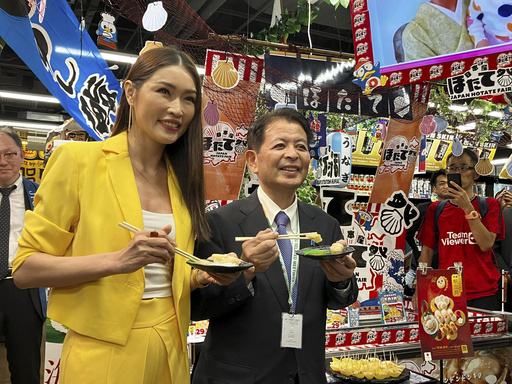KUALA LUMPUR, Malaysia (AP) — Japan hopes to resolve China’s ban on its seafood following the release of treated wastewater from the Fukushima Daiichi nuclear plant within the World Trade Organization’s scope, Agriculture Minister Ichiro Miyashita said Wednesday.
Despite repeated assurances, China banned seafood from Japan immediately after the plant began its treated radioactive wastewater release in August. Seafood accounts for a small portion of Japan’s overall trade but the ban has hit exporters hard as China was the top destination for Japanese seafood exports.
The Japanese government approved a 20.7-billion-yen ($141-million) emergency fund in September to help seafood exporters find new markets and to fund government purchases of seafood for temporary freezing and storage. The country is also stepping up efforts to ease safety concerns as a second round of wastewater discharge is set to begin Thursday.
Miyashita said Japan’s vigorous monitoring since the discharge showed negligible impact on its seafood and agricultural products. All seawater and fish sampling data since the release have been well below set safety limits, he said.
“We are undecided whether to file a complaint (about China’s export ban) to the WTO immediately. At any rate, we hope to find a resolution within the WTO framework,” he told reporters after attending a fair to promote Japanese scallops at a shopping mall.
Russia is also reportedly considering restricting seafood export from Japan — a decision that Miyashita said will depend on the result of sampling and monitoring data. He said Japan is prepared to provide the information to Russia to counter concerns over seafood safety.
The first nuclear wastewater release began Aug. 24 and ended Sept. 11. Japan will begin its second round Thursday to release another 7,800 metric tons of treated wastewater into the Pacific Ocean over 17 days. The discharge, which is expected to continue for decades, has been strongly opposed by fishing groups and neighboring countries including South Korea, where hundreds of people staged protest rallies.
Miyashita arrived in Malaysia on Wednesday for a meeting with Southeast Asian agriculture ministers.
Malaysia has no plans to restrict Japanese fishery import, said Malaysian Agriculture Minister Mohamad Sabu.
He said Malaysia conducts strict testing and so far has found no radioactive element on fish imported from Japan. “So fish from Japan is safe, please eat,” he said after his meeting with Miyashita.
Although Japanese seafood imports to Malaysia dipped in August, Miyashita said sale of certain products like yellowtail fish and frozen scallops rose during the month. To ease concerns over the safety of seafood, he said Japan will hold food fairs overseas to promote the safety of its seafood and bolster export.
“I hope that many people will learn about the deliciousness of Japanese marine products and this will lead to an increase in exports,” Miyashita added.
Japanese officials have said they plan to cultivate new export destinations in Taiwan, the United States, Europe, the Middle East and some Southeast Asian nations such as Malaysia and Singapore.
Source: post





